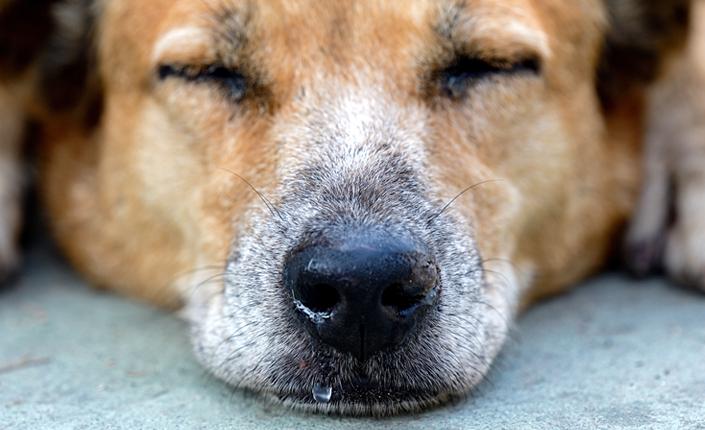
Q: Can my dog or cat catch a cold?
A: People usually use the word “cold” to describe an illness where they experience coughing, sneezing, a runny nose, and a sore throat. A cold may also be called an upper respiratory infection. Dogs and cats can both get upper respiratory infections and display signs typical of a cold.
Q: Can I catch a cold from my dog or cat? Can I give my cold to them?
A: In general, each species has its unique germs that cause colds. People usually get colds from rhinoviruses and an assortment of other viruses. Cats develop cold symptoms when infected with the herpes virus, calicivirus, and Chlamydophila, among others. Dogs usually get colds from Bordetella and a variety of viruses, including canine influenza and parainfluenza.
For the most part, cold viruses can’t be transmitted from one species to another. Most dogs catch colds from other dogs, and most cats catch colds from other cats. In rare cases, Bordetella, the cause of “Kennel Cough,” can be passed between dogs, cats, and people.
Q: What can I do for my dog or cat if they have a cold?
A: In healthy people and animals, most upper respiratory infections are mild and short-lived. However, they can be quite uncomfortable. You can help your pet feel better by cleaning discharge from their eyes and nose regularly with a warm washcloth. Allow your pet to rest, and make sure to offer plenty of water. Stuffy noses can make it hard for pets to smell their food. This can decrease their appetite. Add warm water to dry food, or heat canned food a little bit to make the meal smell more enticing. A little time spent in a humid environment such as a steamy bathroom can help clear your pet’s sinuses.
Q: Do I need to take my pet to the vet?
A: If you think your pet is having difficulty breathing, you should take them to the veterinarian right away. Open-mouthed breathing in cats and exercise intolerance in dogs are essential signs of respiratory distress. Pets that show these signs need to be examined and treated immediately. Pets that have become extremely lethargic or who eat small quantities should also see the vet. Even mild respiratory signs that don’t improve after a week should be investigated by a professional. Some severe diseases such as asthma and heart failure can look a lot like a cold.
Q: How can I prevent colds in my pets?
A: Keep your pets up-to-date on all standard vaccinations. If your dog visits dog parks, groomers, kennels, or other places where dogs mingle, consider additional vaccines for Kennel Cough and canine influenza. Don’t let your pet mingle with other dogs and cats unless you know that they are vaccinated. If your pet seems unwell, keep them separate from other animals until they’ve completely recovered.
Q: What about COVID-19?
A: In rare cases, it has been demonstrated that humans can transmit COVID-19 to dogs and cats. Dogs don’t usually get sick when infected with the novel coronavirus and don’t appear to spread the illness to other dogs or people quickly. Cats infected with the coronavirus may show signs of upper respiratory infection. They can transmit the virus to other cats.
If you have been diagnosed with COVID-19 or think you may have the disease, stay away from people and pets until you’ve fully recovered. Keep your pets indoors, and do not let them interact with people or animals outside of your household. If you have COVID-19 and your dog or cat develops cold symptoms, contact your veterinarian immediately for advice.
Written by: Dr. Sperry, DVM, Veterinary Advisor, Pets Plus Us
The information provided and contained herein are the opinions of PTZ Insurance Services Ltd. which are based on external publication. The content is not intended to be a substitute for professional veterinary advice. PTZ Insurance Services Ltd. assumes no responsibility or liability for any loss, claims or damages arising out of the within content.